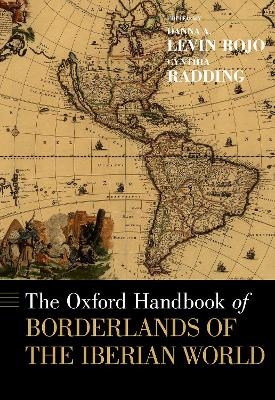
The Oxford Handbook of Borderlands of the Iberian World
Oxford University Press Inc (Verlag)
978-0-19-934177-1 (ISBN)
This collaborative multi-authored volume integrates interdisciplinary approaches to ethnic, imperial, and national borderlands in the Iberian World (16th to early 19th centuries). It illustrates the historical processes that produced borderlands in the Americas and connected them to global circuits of exchange and migration in the early modern world. The book offers a balanced state-of-the-art educational tool representing innovative research for teaching and scholarship. Its geographical scope encompasses imperial borderlands in what today is northern Mexico and southern United States; the greater Caribbean basin, including cross-imperial borderlands among the island archipelagos and Central America; the greater Paraguayan river basin, including the Gran Chaco, lowland Brazil, Paraguay, and Bolivia; the Amazonian borderlands; the grasslands and steppes of southern Argentina and Chile; and Iberian trade and religious networks connecting the Americas to Africa and Asia. The volume is structured around the following broad themes: environmental change and humanly crafted landscapes; the role of indigenous allies in the Spanish and Portuguese military expeditions; negotiations of power across imperial lines and indigenous chiefdoms; the parallel development of subsistence and commercial economies across terrestrial and maritime trade routes; labor and the corridors of forced and free migration that led to changing social and ethnic identities; histories of science and cartography; Christian missions, music, and visual arts; gender and sexuality, emphasizing distinct roles and experiences documented for men and women in the borderlands. While centered in the colonial era, it is framed by pre-contact Mesoamerican borderlands and nineteenth-century national developments for those regions where the continuity of inter-ethnic relations and economic networks between the colonial and national periods is particularly salient, like the central Andes, lowland Bolivia, central Brazil, and the Mapuche/Pehuenche captaincies in South America. All the contributors are highly recognized scholars, representing different disciplines and academic traditions in North America, Latin America and Europe.
Danna Levin Rojo is professor of history at Universidad Autónoma Metropolitana-Azcapotzalco and the author of Return to Aztlan: Indians, Spaniards, and the Invention of Nuevo México. She is a member of the Sistema Nacional de Investigadores de México and of the editorial board of the Anales del Instituto de Investigaciones Estéticas (UNAM, México). She chaired the Postgraduate Program on Historiography at Universidad Autónoma Metropolitana and is secretary of the board of directors of the Americas Research Network. Cynthia Radding is Gussenhoven Distinguished Professor of History at the University of North Carolina-Chapel Hill. She is the author of Landscapes of Power and Identity. Comparative Histories in the Sonoran Desert and the Forests of Amazonia from Colony to Republic and co-editor of Borderlands in World History. Radding is president of the board of the Americas Research Network and has served on the editorial boards of Hispanic American Historical Review,American Historical Review, and The Americas and on the advisory council of the Inter-American Foundation.
Introduction, Danna A. Levin Rojo and Cynthia Radding
Part I: Indigenous Borderlands, Cultural Landscapes, and Spheres of Power in the Americas
Chapter 1: Patterns of Food Security in the Prehispanic Americas, Amy Turner Bushnell
Chapter 2: Crafting Landscapes in the Iberian Borderlands of the Americas, Cynthia Radding
Chapter 3: Fluctuating Frontiers in the Borderlands of Mesoamerica, Fernando Berrojalbiz and Marie-Areti Hers
Chapter 4: Population and Epidemics North of Zacatecas, Chantal Cramaussel
Chapter 5: "Indian friends and allies" in the Spanish Imperial Borderlands of North America, Danna A. Levin Rojo
Chapter 6: The Indian Garrison Colonies of New Spain and Central America, Sean F. McEnroe
Chapter 7: Inter-Ethnic War in Sonora: Indigenous Captains General and Cultural Change, 1740-1832, José Marcos Medina Bustos and Ignacio Almada Bay
Chapter 8: Native Informants and the Limits of Portuguese Dominion in Late-Colonial Brazil, Hal Langfur
Part II: Transcontinental Borderlands in Ibero-America
Internal Trade Networks: Commercial and Migratory Labor Circuits
Chapter 9: Indigenous Trade in Caribbean Central America, 1700s-1800s, Alejandra Boza and Juan Carlos Solórzano
Chapter 10: Connections and Circulation in the Southern Andes from Colony to Republic, Viviana Conti
Chapter 11: The Royal Road of the Interior in New Spain: Indigenous Commerce and Political Action, Tatiana Seijas
Shifting Identities in Relation to Gender, Demography, Ethnicity, and Mestizaje
Chapter 12: Indigenous autonomy and the Blurring of Spanish Sovereignty in the Calchaquí Valley, Sixteenth to Seventeenth Century. Christophe Giudicelli
Chapter 13: Labyrinths of Mestizaje: Understanding Cultural Persistence and Transformation in Nueva Vizcaya, Susan Deeds
Chapter 14: Borderlands in the Silver Mines of New Spain, 1540-1660, Dana Velasco Murillo
Chapter 15: Indigenous Histories in Colonial Brazil: Between Ethnocide and Ethnogenesis, John M. Monteiro
Chapter 16: Colonization, Mediation, and Mestizaje in the Borderlands of Nineteenth-Century Minas Gerais, Brazil, Izabel Missagia de Mattos
The Production of Knowledge: Science and Cartography, Art, Religion, and Music
Chapter 17: Borderlands of knowledge in the Estado da Índia (sixteenth-eighteenth centuries), Ines G. %Zupanov
Chapter 18: Tierra Incognita: Cartography and Projects of Territorial Expansion in Sonora and Arizona, Seventeenth and Eighteenth Centuries, José Refugio de la Torre Curiel
Chapter 19: The Virgin of El Zape and Jesuit Missions in Nueva Vizcaya, Clara Bargellini
Chapter 20: Franciscan Mysticism on the Northern Frontier of New Spain, Cecilia Sheridan Prieto
Chapter 21: Musical Cultures of the Ibero-American Borderlands, Kristin Dutcher Mann and Drew Edward Davies
Chapter 22: Frontier Missions in South America: Impositions, Adaptations, and Appropriations, Guillermo Wilde
Shifting Territories and Enduring Peoples in the Iberian-American Borderlands
Chapter 23: Borderlands of Bondage, Andrés Reséndez
Chapter 24: Riverine Borderlands and Multicultural Contacts in Central Brazil, 1775-1835, Mary Karasch
Chapter 25: Conflict, Alliance, Mobility, and Place in the Evolution of Identity in Portuguese Amazonia, Barbara A. Sommer
Chapter 26: Autonomous Indian Nations and Peacemaking in Colonial Brazil, Heather F. Roller
Part III: Imperial Borderlands and Trans-Oceanic Exchanges: Some Perspectives
Chapter 27: Trans-Imperial Interaction and the Rio de la Plata as an Atlantic Borderland, Fabrício Prado
Chapter 28: The Construction of a Frontier Space: Interethnic Relations in Northern Bolivia, Pilar García Jordán and Anna Guiteras Mombiola
Chapter 29: The Spanish Empire's Southernmost Frontiers: From Arauco to the Strait of Magellan, Elizabeth Montanez Sanabria and María Ximena Urbina
Chapter 30: Shaping an Inter-imperial Exchange Zone: Smugglers, Runaway Slaves, and Itinerant Priests in the Southern Caribbean, Linda M. Rupert
Chapter 31: The Pacific Borderlands of the Spanish Empire, Catherine Tracy Goode
Chapter 32: Converting the Pacific: Jesuit Networks between New Spain and Asia, Brandon Bayne
Chapter 33: Indigenous Diaspora, Bondage, and Freedom in Colonial Cuba, Jason M. Yaremko
Chapter 34: Impact on the Spanish Empire of the Russian Incursion into the North Pacific, 1741-1821, Martha Ortega
| Erscheinungsdatum | 06.12.2019 |
|---|---|
| Reihe/Serie | Oxford Handbooks |
| Zusatzinfo | 41 illustrations |
| Verlagsort | New York |
| Sprache | englisch |
| Maße | 249 x 183 mm |
| Gewicht | 1724 g |
| Themenwelt | Sachbuch/Ratgeber ► Geschichte / Politik ► Allgemeines / Lexika |
| Geisteswissenschaften ► Geschichte ► Allgemeine Geschichte | |
| Geisteswissenschaften ► Geschichte ► Regional- / Ländergeschichte | |
| Sozialwissenschaften ► Ethnologie | |
| Sozialwissenschaften ► Soziologie | |
| ISBN-10 | 0-19-934177-X / 019934177X |
| ISBN-13 | 978-0-19-934177-1 / 9780199341771 |
| Zustand | Neuware |
| Haben Sie eine Frage zum Produkt? |
aus dem Bereich


